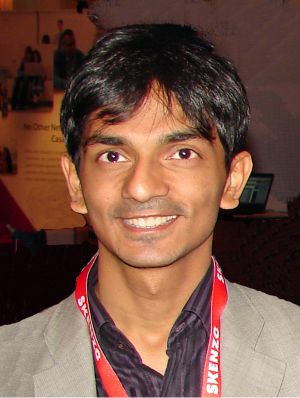|
Turakhia has been featured in so
many business magazines that just about everyone has lost
count now (a Google search on his name will bring up many
of them). As a result of his phenomenal success, Turakhia
is frequently invited to speak at industry conferences and
workshops and at top universities in the U.S., India
and China where students soak up his advice on
Entrepreneurship.
|
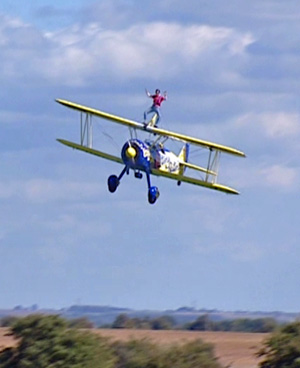
Divyank
Turakhia takes "flying high"
literally.
That's him on top of the airplane! |
Turakhia has managed to defy gravity
in the business world so it is probably not
surprising that he spends much of his free time
trying to do the same thing for fun. His hobbies
include airplane Wing Walking, Aerobatic Flying,
Ballooning, Sky Diving, Scuba Diving, Hobby Flying,
Paragliding, Sailing, Quad Biking, Trekking, Rock
Climbing and other pursuits that leave guys like me
exhausted just thinking about them.
Divyank is obviously cut
from a unique bolt of cloth. While looking
into what makes Turakhia tick we wound up getting a
great case history on how someone could build
a nine-figure business in just a few short years.
With all of the talk among domainers today about
taking it to the next level through
development and building real businesses, Turakhia
provides an object lesson that we can all learn
from.
Turakhia's story started
on January 29, 1982 when he was born in the world's
most populous city, Bombay (now known as Mumbai).
With an estimated 13 million residents Mumbai
has the kind of crowd |
| it can be hard to stand
out in, but Turakhia soundly beat all of the odds.
He credits a tight knit family for helping him get
started on the right foot. His father is a chartered
accountant who runs his own business specializing in
tax consulting, auditing and company incorporations
and his mother is a law school graduate. "She
is a remarkable woman who has devoted most of her
life to charity work," Turakhia said.
"Since I can remember, she has been
spearheading projects that help the
underprivileged." Turakhia is also close to his
brother Bhavin who joined him in co-founding
Directi. |
|
|
"Bhavin is two years
older than me but from our childhood on we have had very
similar interests, goals, thought process, and even the
same friends and peer group," Divyank said. "We
work, live and vacation together. I can't imagine having
done even half of what I have achieved today without
him."
"Some of the most successful companies in the
world have been founded by a two person team - Microsoft
with Bill Gates and Paul Allen, Apple
with Steven Jobs and Steve Wozniak, Adobe
with John Warnock and Charles Geschke, Google
with Larry Page and Sergey Brin. Having more
than a single intelligent, logical, entrepreneurial person
at the top ends up creating an environment that is far
more productive and efficient. For instance, both of us
would have the ability to make decisions independently -
but having a short discussion on a particular product, or
feature or business decision can lead us to see something
that we hadn't thought of - this is very conducive to
growth," Divyank added.
The Turakhia family got a good idea of where Divyank's
life would lead while he was still in grade school. "I
had a very keen interest in |
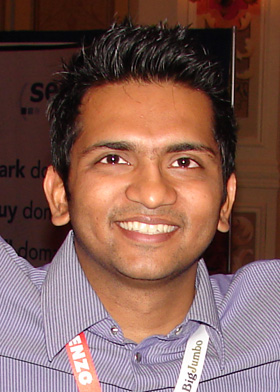
Bhavin
Turakhia
Directi Co-Founder |
| working with technology and
computers since I was 8 years old," Turakhia
said. "I couldn't afford my own computer, so I used
the ones that belonged to richer friends. These were the
days when the popular home computer was the ZX Spectrum
where software needed to be loaded via audio cassette
tapes." |
"When I was
9, I started programming in Basic and had a special
interest in Computer Game Programming. I created my first three
games as part of a school project when I was 12 - a Car Racing
Game, an Alien Shooting Game and a Trivia Game - all of which
became pretty popular in my school. I loved computers to such an
extent that while other kids spent their time playing football,
basketball, cricket and the likes, I spent all my lunch breaks
and after school time in the computer lab. Between the ages of
12-14, I used to hold after-school sessions to teach advanced
concepts in GWBasic to a class of students and teachers
that were interested in learning about the same. The school
didn't have anyone who knew much about it since this wasn't part
of the standard curriculum," Turakhia said.
It normally
takes years of computer science training in college to acquire
the kind of technical expertise that Turakhia had acquired
before reaching his teens. "All the skills that I have are
mostly self-learnt. I am an avid reader. I had the habit of
reading every book or article that I could lay my hands on -
technology, business, management, time-management, biographies
etc. The primary advantages of learning by yourself are (1) you
can focus solely on the areas that interest you the most, (2)
you can learn at a much faster pace, (3) you can learn directly
from the best subject-matter experts in the world by reading
books and articles written by them," Turakhia said.
|
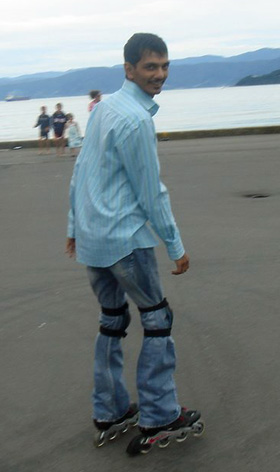
Turakhia
got on a roll in his teens and
he has been picking up speed ever since. |
"Part of the reason
why I read so much is because my father was very
passionate about books and through his life he spent a
huge portion of his earnings on building a massive library
at home. I had multiple books on every topic at my home.
He always encouraged us to do things independently and was
supportive of everything that we wanted to do."
Turakhia quickly put the
things he read about to practical use. "At 13, I
co-created the world's largest game and computer program
written in GWBasic along with my brother. It took us
nearly the whole year to finish the program. When we were
near completion we ran into a problem that we hadn't
anticipated - GWBasic was not designed to allow a program
of this size to run - we could have switched to QBasic
but wanted the program to run in GWBasic and hence didn't
make that switch. In order to complete the program, we had
to start "optimizing" the existing code by
re-coding portions of the program, using smaller variable
names, and even switching command statements such as
"PRINT" to "?" so that we would save 4
bytes. The end-result was an ultimate business
simulation game."
"The game starts
with an animation sequence which talks about how your
business partner deceitfully takes over your entire
company and you are now left with no money. The object
of the game was to start from scratch, create |
| a successful business, and get
100% of the market share. To grow the company, the player
must manage resources in terms of money and employees, and
create and manage ongoing budgets for various departments
such as HR, Research & Development, Marketing, Sales,
Finance, Legal etc. The game even allowed the player to
perform corporate treasury operations by investing money
on the stock market. The program used various probability
algorithms keeping in mind best practices from various
business management books. Playing the game was
educational, creating it was an experience," Turakhia
said. |
Despite his
tender age, the business focus of Turakhia's computer game came
as no surprise to Turakhia's friends and family. "I was
very entrepreneurial while growing up. At the age of 13, I was
selling computer projects to rich school kids who couldn't make
their own project. Each project that I made got an A
grade, so it was well worth the money for them, and I spent less
than two hours in making each project - so it was easy money,"
he recalled.
"These were
still the pre-internet days. Computer Networks were becoming the
buzz word. We started a fledgling bulletin board system (BBS)
using the RemoteAccess BBS software and a 2400 baud
modem. Only our close friends could connect to it. These were
the days when ANSI Galleries and the BBS game Legend
of The Red Dragon (LORD) were very popular. I shortly
upgraded to the Wildcat BBS Program, and started
supporting the NCSA Mosaic browser at 14.4k connection
speeds. One had to manually install Trumpet Winsock and Mosaic
on their Windows 3.1 PC to view the graphics. Because of our
experience of running the BBS, we already knew more about the
internet and networking than most other people when internet
services were first launched in India in 1995," Turakhia
said.
|
"When I was 14, I
started freelance internet consulting for large corporates.
I did that for two years. Freelancing worked out perfectly
well – it gave me more “disposable money” than the
richest kids on the block. I was having a lot of fun doing
what I was doing."
"My primary focus
areas were helping companies setup their websites, setting
up internet gateways, setting-up intranets,
setting-up corporate email accounts, managing
internal and intra-office network security policies,
setting up and configuring any technology related product
or software that the company couldn’t do by itself etc.
I even assembled computers for a few companies.
These were the really old days when nothing
was plug-and-play; you had to configure the ISA cards that
go into the machines using jumpers. Around the time I was
involved with freelance consulting, Bhavin was trying his
hands with different businesses - some around selling
computers, and others around end-user internet services."
"The challenge with
running any technology-based services business is that you
can generally manage only a limited number of projects.
Each project might be worth a lot of money, but there is a
maximum limit beyond which growth stagnates due to
unavailability |
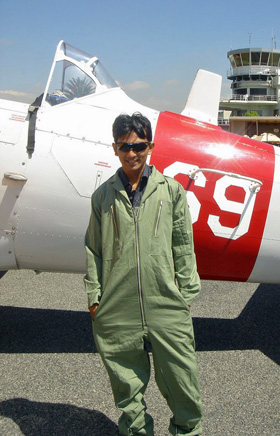
Turakhia's
career took off at age 14. |
| of human resources within your
company. Also, the return on human capital is very low in
a services business as compared to a products company.
Before starting Directi, we recognized that if we wanted
to build a company that is really big – we need to focus
on volume based products," Turakhia
noted. |
"When I was
16 and still in high school, Bhavin and I co-founded Directi by
borrowing $600 from our parents. When we started Directi, our
strategy was to build a set of mass market products that are
indigenously developed, that are global in nature, that do not
require customization per customer, that thrive on innovation,
creativity and automation. The idea was to focus on building
growth-intensive intellectual property and stay away from
capital-intensive infrastructure projects or any form of service
that would require customization on a per customer basis. This
meant that if the products that we built were successful, our
margins would be very high as development costs would remain
near similar whether we had a hundred customers, ten thousand
customers, or a million customers."
|

|
"With this we
started our first product line. We started a business unit
that sells hosting packages directly to end customers. The
idea was that everyone is eventually going to
require a domain name and a web hosting package. It was
the most obvious volume based product that everyone would
need."
"The initial
investment of $600 was spent towards the payment of our
first server's monthly lease. In the first month itself we
signed up 40 customers. This allowed us to return the
money that we borrowed from our parents and pay the
server's lease bill for the next 3 months. Within the
first few months, we were hosting the who-is-who of the
Indian market - including the likes of National
Association of Software and Service Companies (NASSCOM),
Centre for Monitoring Indian Economy, Nationalist
Congress Party etc. At the |
| age of 17 I was already being
quoted and featured in publications such as Indian
Express, Rediff etc. and at 18, my
net worth was over $1 Million," Turakhia said.
Soon after, Turakhia's big opportunity in domains
opened up when the Network Solutions (NSI) monopoly
in the registration business came to an end. "Until
early 1999, Network Solutions was the only registrar (and
also the registry), and as several of the early domainers
would tell you - the retail price of domains was as high
as $70 for two years. Every hosting company
including ourselves was a reseller of NSI. With the
formation of ICANN in 1998, the functions of the
registry and registrar were separated, and 5 registrars
were accredited as part of an initial testbed in 1999 - Register.com,
Melbourne IT, CORE, AOL and France
Telecom." |
"As a result, the price of domains started coming down
because of the competition. After the initial testbed, ICANN
started accrediting other applicants that met the criteria that
it had set. In October 1999, Tucows revolutionized the
wholesale domain name registration market with its launch of OpenSRS
- domains were now available for just $13 a year. We
signed up as a Tucows reseller and substantially increased the
number of domains that we were registering," Turakhia
said.
|
"Domain names were the entry point to
sell all web services - web hosting, dedicated
servers, digital certificates, payment gateway solutions
etc.," Turakhia said. "We made a substantial
amount of money by selling domains at a low cost, which
allowed us to fund our own ICANN accredited
registrar. Being ICANN accredited is the logical growth
step for any large web services company that sells domains
or hosting packages."
"In 2000, we
started a new business unit within the Directi Group - Transecute
- India's first payment gateway service. The primary
reason for starting it was that we wanted to start
collecting money online via credit cards for our own
domain registration and hosting business, and there was no
solution available in India for the same."
"Since we needed to
build it for ourselves, we built it out as a product that
we could sell to any other customer. We continued to be
the largest payment gateway service in the country for a
very long time. We are still the only one that used
advanced heuristic fraud detection and risk management
technology. The algorithms that we wrote back then are
still considered to be extremely advanced and used only by
the most premier of payment gateway companies in the world
as of right now for credit card risk mitigation,"
Turakhia said.
"We could have
patented several of the algorithms, but didn't realize it
at the time. Even though the business made a few
million |
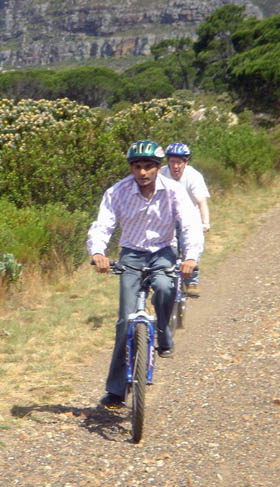
No
matter how rough the terrain
has been, Turakhia has managed
to stay ahead of the pack. |
| dollars over the years and was
quite profitable, we pulled out all the resources from the
transecute project as it didn't meet an important
criterion that we had set for all our business units - it
wasn't global in nature - the service could only be
sold within India due to banking regulations. We felt that
our time would be better utilized on building products and
focusing on business units that were global as they would
make more money in the long term." |
"In early 2001, about 8
months from the time we had applied to ICANN, we got our own
ICANN accredited registrar, now known as PublicDomainRegistry.com.
We had realized that technology was our primary core
competence. We could build web applications better, faster and
cheaper than everyone else. Also, we realized that in a global
market, customers wanted local support in their local language
and also wanted local payment options. The only way to capture a
large market share was through partnerships. We decided
to adopt a reseller model (currently under the brand name of ResellerClub)
and from here on we focused on selling all our web services
primarily through a channel of partners around the world,"
Turakhia explained.
"The business grew
substantially over the years. By the time I was 21, the business
had over 100,000 customers. ResellerClub is currently one of the
Top 5 private-label web solution providers in the world. It has
over 50,000 resellers in 200+ countries.
PublicDomainRegistry.com is currently the 10th largest ICANN
Accredited Registrar worldwide withover 2 Million domains
registered. It is also currently one of the fastest growing
domain registrars in the world."
|
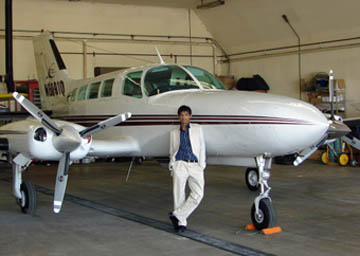
Directi's
success allows Turakhia to travel in style. |
"Before starting to
build the software that would power our own domain
registrar, we created a separate business unit that would
build this software so that it could be used by ANY
company that is ICANN Accredited. The unit was created
entirely independent of the existing business and treated
Directi's own Registrar as an external customer. This
business unit was officially launched under the brand of LogicBoxes
in 2003 as the first and only comprehensive business
automation solution for ICANN Accredited Registrars. As of
now, it is the world's #1 largest provider of complete
business automation solutions for domain registrars,"
Turakhia noted. |
|
"LogicBoxes currently
powers the infrastructure and software of over 50 ICANN
Accredited Domain Registrars, several ccTLD Registrars and
thousands of Web Hosts worldwide. It also provides
Consultancy Services to Registrars, Registries and Web
Service Providers. These services range from obtaining and
managing ICANN/ccTLD Accreditations, to providing Business
Process Automation and Outsourcing solutions. LogicBoxes
has had a 100% success rate in obtaining an ICANN
Accreditation for its clients. Several domainers have
acquired their own domain registrar via LogicBoxes in
order to obtain ultimate control over their own domains.
LogicBoxes has also started providing consultancy services
and business automation software to companies that want to
apply for their own gTLD (registry) with ICANN,"
Turakhia added. |
Domain monetization was the
next world Turakhia set out to conquer. "In early 2004,
Directi signed a deal with Google to monetize its own
registrar traffic. Since domain parking wasn't part of our core
business, we didn't utilize our primary development team for it,
and both Bhavin and I didn't pay much attention to it. We
assigned the project internally to the small team that was then
managing our not-for-profit WebHosting.Info business
unit. Around the end of 2005, the members of this team stopped
working with our company. The revenue generated from the project
was small, and the majority of the profit was a direct result of
Directi's own registrar traffic, so I took over the domain
parking project with the intent to shut it down, and use
one of the existing parking companies for monetizing our own
traffic," Turakhia recalled.
| "When I started evaluating the
solutions in the market, including our own, I realized
that despite the fact that all the domain parking
companies have been in this business for several years,
the technology used by each of them was primitive and
basic. I saw this as a very large opportunity and
immediately built a new team of about 20 people to start
working on my ideas. Since late 2005, I have spent near 100%
of my time solely on the Skenzo Business Unit
and continue to do so."
"Because of the superior |

|
| technology that we put in to
place, we started growing very rapidly. By the end of
2006, we had over 100 people working in the Skenzo
business unit and we were the #1 fastest growing domain
parking company in the world for 2006 by revenue and head
count. By the end of 2007, we had over 200 employees
working with Skenzo and we were once again the #1 fastest
growing domain parking company in the world for 2007 by
revenue and head count and had also become the #2 largest
domain parking company in terms of monthly revenue, second
only to Oversee.net (parent of DomainSponsor),
who had been in the business since 2000," Turakhia
said. |
"Over the last 12 months,
we have monetized over 20 million unique domain names. At
any given point of time, we are monetizing over 5-7 million
unique domains. Our diverse client base includes some of the
world's most successful and influential domain portfolio
holders, domain registrars, and online publishers. As of right
now, with 250+ employees, Skenzo is the largest domain parking
company in terms of head count," Turakhia said.
 |
"We were the first company to build a
managed parking platform where clients who have their own
direct advertising feeds can use our superior technology
to make more revenue on their own direct ad feeds. We
continue to innovate rapidly and most of our resources are
spent towards building newer technology. Our primary
strategy and advantage has been the use of self-created
leading-edge technology, high-quality research, and
proprietary processes that allow us to consistently
produce long-term superior results for our customers,"
Turakhia added. |
Skenzo's growth caught the eye
of capital investors. "Earlier this year, the Ashmore
Group acquired a significant minority in our Skenzo business
unit. The Ashmore Group is one of the world’s leading
Investment Firms managing over $36 billion. This was the
first external investment in any of our businesses. It was a
late-stage investment – the business was already making good
money and didn’t need any capital. We got Ashmore on board
because we wanted a partner that had the expertise, the
experience and the track record necessary for our aggressive
growth plans for this business unit. Historically, we have grown
all our businesses organically. We wanted a financial partner on
board who would assist us with inorganic growth, who would
assist us with evaluating and closing M&A transactions, who
would help the business access various types of capital for
further expansion in the future," Turakhia said.
Directi has continued to grow
rapidly this year. The company currently has over 550 employees.
"By the end of this year, we will be moving into our new
headquarters, a $45 million facility that is 100,000
square feet in size," Turakhia said. "The new
facility includes really cool amenities including a Bowling
Alley, a fully-equipped Gym, Pool, Table Tennis, a large DVD
Library, a Movie room, Multi-Player gaming room with Arcade
games, Xbox's, Playstations, WII's, a Salon where employees can
get free massages, haircuts, pedicures, manicures etc, a
full-fledged canteen that provides free lunches, dinner etc.
We are also in the process of signing another deal to acquire
yet another facility that is also about 100,000 square feet in
size and expected to be ready by mid 2009."

Directi
will move into a new 100,000 square foot headquarters building
later this year.
"Every business that I
have been involved with has seen exponential growth,"
Turakhia noted. "At the minimum, each business has doubled
in revenues and head-count every year. The first business
was started with $600 that was borrowed from my parents, and
after that every new business and product development initiative
has been funded solely from internal accruals."
"The combined product portfolio
of various Directi businesses includes Traffic Monetization
Solutions, Online Advertising Solutions, Communication and
Collaboration apps, Social Networking software, Instant
messaging, Context Analysis Engines, Antispam and Antivirus
Solutions, Large scale Billing and Provisioning platforms,
DNS Management Products, Linux and Windows Server Management
Software, Web Hosting Control Panels and much more. Every
product that we have launched is focused on a global audience,
and every business that sells these products ranks among the Top
10 businesses worldwide in their respective industry's segments."
As if that
weren't enough, Turakhia noted that "Directi recently
acquired the .pw
ccTLD registry. We have been developing some products around
this over the last two years. The goal of the project is to
provide a unified, ubiquitous, intuitive and extensible
communication platform to users and businesses worldwide. We
have committed substantial resources to this new initiative.
Bhavin is currently heading this initiative."
Turakhia said
the company's phenomenal growth has been fueled by bringing the
right people onboard. "Since our inception in 1998, our
policy is to hire the best, provide them with the resources and
authority, and then step out of the way," Turakhia said.
"Without the best people, you can’t build the best
company. We make mistakes, just like anyone else. But we also
make more decisions, better decisions and faster decisions than
most other companies."
|
"Authority is
decentralized. Hierarchy is purely structural in nature.
Every employee has the authority to make independent
decisions with respect to their work. My job is merely to
make available and accessible the right training and
knowledge, the best tools and resources, and the
information that an individual needs to make better
decisions. I try to spend a significant portion of my
personal time towards Human Resources. When the majority
of the people within the company pro-actively make
decisions by themselves, the growth rate increases
significantly," Turakhia said.
"The environment at
Directi helps nurture innovation, creativity, and
collaboration. We also strive to provide a very dynamic
& fun work place - check out http://careers.directi.com/work-culture/.
Some of the benefits and fun stuff we encourage are
Interest Groups where individuals within the organization
are encouraged to start and operate their own interest
groups. There are salsa workshops, treks, multi-player
games, movies and many other interesting activities that
are held regularly by these interest groups with complete
support from the organization."
"We also offer
Concierge Services to all employees so that their
day-to-day tasks and chores are effectively taken care of.
We sponsor various educational courses for all employees
to foster personal growth for individuals which benefits
them as well as the organization. In addition, Directi's
attendance policies are structured such that each team |
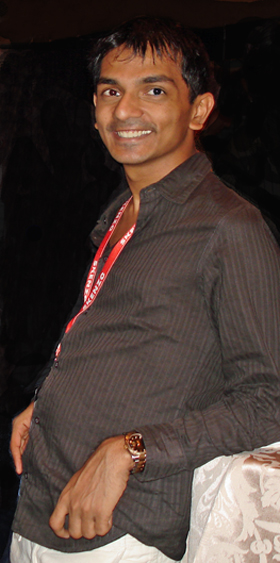
|
| has their own flexi timing.
This enables individuals and teams to plan their work
hours and personal time in the most efficient manner." |
With amenities
like that, it's not likely Directi will ever face a shortage of
talent that wants to work there. While Turakhia could sit back
and let others carry the ball now, the energetic 26-year-old
says there is much more to come from him. "I have an
infinite number of new business ideas and new product
development ideas. So I would say that in 5-10 years we would
see a lot more products, a lot more businesses, a lot more
customers, and a lot more revenue!" Turakhia
concluded.
|


